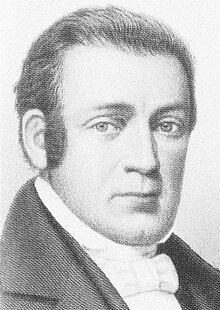Paul Moody
Paul Moody (born May 23, 1779 in Newbury , Massachusetts , United States , † July 7, 1831 in Lowell ) was an American inventor of machines for the production of textiles . His most important development was a power chair for the Boston Manufacturing Company in Waltham , founded in 1813 , which is regarded as the nucleus of the industrialization of the United States.
biography
Born in Newbury's Village Byfield , Moody was one of nine children in the family. At the age of 16 he learned the trade of weaver and quickly became an expert in it. He took a job at Jacob Perkins' nail factory and moved the company to Amesbury . In 1812 he worked for a manufacturer of carding machines .
In 1800 (according to another source as early as 1798) he married Susannah Morrill, who came from Amesbury, and had three sons with her. On February 6, 1813, he founded the Amesbury Wool and Cotton Manufacturing Company with Ezra Worthen, Thomas Boardman and Samuel Wigglesworth .
Activities in Waltham
At the end of 1813 he moved to Waltham to supervise the establishment of the Boston Manufacturing Company for Francis Cabot Lowell . Moody further developed British technologies and also designed his own machines such as the power chair , the patent of which fell to his employer.
During his time in Waltham, Moody was awarded various patents relating to improvements or new developments of machines and systems as well as their components for the production of textiles.
Activities in Lowell
Building on the success of their Waltham business, the Boston Associates built a new, drawing-board-planned industrial town on the Merrimack River in East Chelmsford from 1821 to 1825 , which they named after their late partner Lowell . It was there in 1824 that Moody founded the Lowell Machine Shop , which was incorporated into the Saco-Lowell Shops at the beginning of the 20th century in order to supply the surrounding textile factories with machines. He also developed the drive of the machines further by inventing a system of leather straps, gears and flywheels that increased efficiency and reduced downtime.
From 1823 to 1825, Moody worked as the chief engineer for The Proprietors of Locks and Canals on the Merrimack River , living in the house that is now the Whistler House Museum of Art .
Moody died suddenly in Lowell in 1831 after illness for several days. Streets in Waltham and Lowell were named after him.
Web links
- Literature by and about Paul Moody in the WorldCat bibliographic database
Individual evidence
- ^ A b Charles CP Moody: Biographical sketches of the Moody family: embracing notices of ten ministers and several laymen, from 1633 to 1842 . SG Drake, Boston 1847, OCLC 367952435 , p. 145 ( limited preview in Google Book search).
- ^ Frederick W. Coburn: History of Lowell and its people . Lewis Historical Pub. Co., New York 1920, OCLC 8585512 .
- ↑ a b c Paul Moody. In: Dictionary of American Biography. Charles Scribner's Sons, 1936, accessed December 14, 2016 .
- ↑ a b c Paul Moody. In: Encyclopedia of World Biography. Gale CENGAGE Learning, 2009, accessed December 14, 2016 .
- ↑ Commonwealth of Massachusetts: Chaper 80. An Act To Incorporate The Amesbury Wool And Cotton Manufacturing Company. (PDF) 1812, p. 153 , accessed on December 16, 2016 (English).
- ^ John N. Ingham: Biographical dictionary of American business leaders . Greenwood Press, Westport, Conn. 1983, ISBN 978-0-313-21362-5 ( limited preview in Google Book Search).
- ^ National Park Service : Suffolk Mills Turbine Exhibit. (PDF) Accessed December 16, 2016 .
- ^ Paul Marion: Mill Power . Rowman and Littlefield, New York 2014, ISBN 978-1-4422-3628-8 ( limited preview in Google Book Search).
| personal data | |
|---|---|
| SURNAME | Moody, Paul |
| BRIEF DESCRIPTION | American inventor of machines for the production of textiles |
| DATE OF BIRTH | May 23, 1779 |
| PLACE OF BIRTH | Newbury , Massachusetts , United States |
| DATE OF DEATH | July 7, 1831 |
| Place of death | Lowell |
